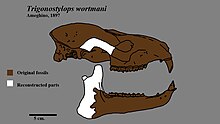Trigonostylops is an extinct genus of South American meridiungulatan ungulate, from the Late Paleocene to Late Eocene (Itaboraian to Tinguirirican in the SALMA classification) of South America (Argentina and Peru) and Antarctica (Seymour Island). It is the only member of the family Trigonostylopidae.
| Trigonostylops | |
|---|---|

| |
| Skull restoration of Trigonostylops | |
| Scientific classification | |
| Domain: | Eukaryota |
| Kingdom: | Animalia |
| Phylum: | Chordata |
| Class: | Mammalia |
| Order: | †Astrapotheria |
| Family: | †Trigonostylopidae |
| Genus: | †Trigonostylops Ameghino 1897 |
| Type species | |
| Trigonostylops wortmani Ameghino 1897
| |
| Species | |
| |
Description
editA complete skull of the type species, T. wortmani, has been found, and it has been classified as an astrapothere based on its large lower incisors.[1]
Phylogeny
editCladogram based in the phylogenetic analysis published by Vallejo Pareja et al., 2015, showing the position of Trigonostylops:[2]
Distribution
editLocations of Trigonostylops fossils
Pozo Formation
Sarmiento Formation
Las Flores Formation
Not show: La Meseta Formation in Seymour Island, Antarctica
Fossils of Trigonostylops have been found in:[3]
- Paleocene
- Eocene
References
editWikimedia Commons has media related to Trigonostylops.
- ^ Palmer, D., ed. (1999). The Marshall Illustrated Encyclopedia of Dinosaurs and Prehistoric Animals. London: Marshall Editions. p. 249. ISBN 978-1-84028-152-1.
- ^ Vallejo Pareja et al., 2015
- ^ Trigonostylops at Fossilworks.org
- ^ Goin et al., 2009
- ^ Dzik & Gaździcki, 2001
- ^ Vera, 2012
- ^ Cifelli, 29185, p.5
- ^ Antoine et al., 2011
Bibliography
edit- Antoine, P.O.; Marivaux, L.; Croft, D.A.; Billet, G.; Ganerod, M.; Jaramillo, C.; Martin, T.; Orliac, M.; Tejada, J.; Altamirano, A. J.; Duranthon, F.; Fanjat, G.; Rousse, S.; Salas Gismondi, R. (2011). "Middle Eocene rodents from Peruvian Amazonia reveal the pattern and timing of caviomorph origins and biogeography". Proceedings of the Royal Society B. 279 (1732): 1319–1326. doi:10.1098/rspb.2011.1732. PMC 3282368. PMID 21993503. S2CID 26368929. Retrieved 2019-02-14.
- Cifelli, R (1985). "Biostratigraphy of the Casamayoran, Early Eocene of Patagonia" (PDF). American Museum Novitates (2820): 1–26. Retrieved 2019-02-14.
- Dzik, J.; Gaździcki, A. (2001). "The Eocene expansion of nautilids to high latitudes" (PDF). Palaeogeography, Palaeoclimatology, Palaeoecology. 172 (3–4): 297–312. Bibcode:2001PPP...172..297D. doi:10.1016/S0031-0182(01)00304-2. Retrieved 2019-02-14.
- Goin, F.J.; Candela, A.M.; Abello, M.A.; Oliveira, E.V. (2009). "Earliest South American paucituberculatans and their significance in the understanding of 'pseudodiprotodont' marsupial radiations". Zoological Journal of the Linnean Society. 155 (4): 867–884. doi:10.1111/j.1096-3642.2008.00471.x. S2CID 84131123. Retrieved 2019-02-14.
- Vallejo Pareja, M.C.; Carrillo, J.D.; Moreno Bernal, J.W.; Pardo Jaramillo, M.; Rodríguez González, D.F.; Muñoz Duran, J. (2015). "Hilarcotherium castanedaii, gen. et sp. nov., a new Miocene astrapothere (Mammalia, Astrapotheriidae) from the Upper Magdalena Valley, Colombia" (PDF). Zurich Open Repository and Archive, University of Zurich. 35 (2): 1–14. Bibcode:2015JVPal..35E3960V. doi:10.1080/02724634.2014.903960. S2CID 130728894. Retrieved 2019-02-14.
- Vera, B (2012). "Revisión del género Transpithecus Ameghino, 1901 (Notoungulata, Interatheriidae) del Eoceno medio de Patagonia, Argentina". Ameghiniana. 49: 60–74. doi:10.5710/AMGH.v49i1(361). S2CID 130102948. Retrieved 2019-02-14.